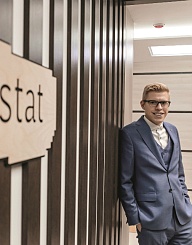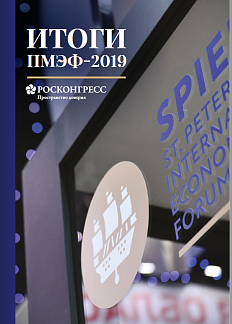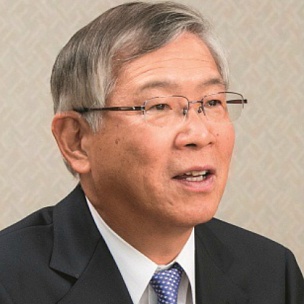28 years old.
WHAT: Roistat. A system offering end-to-end analytics of advertising costs and Internet sales.
SCALE: The company has been able to grow to 4,000 paid projects in the space of four years. It raised more than 1 billion roubles in the current investment round. Growth rate is 15% per month.
STARTUP: Programming skills, a system administrator’s salary, and a Veliky Novgorod residence permit.
CREDO: «Make decisions, even when your level of certainty is almost zero.»
German Gavrilov notes, «I get angry when I see inefficiency.» Just then I hear a chaotic racket coming from behind the door of his office: the Roistat employees are playing table football. They can allow themselves this bit of fun because the company has a system for tracking task completion. If you get everything done on time or before the deadline, then you can relax.
Efficiency is made possible, first and foremost, by calculation and analysis. However, at first, German developed his career haphazardly. After finishing school in his native Veliky Novgorod, he enrolled at a local university to study computer programming. However, a year later he transferred to St. Petersburg Polytechnic University where he enrolled in a distance learning course with the Faculty of Cybernetics, working as a system administrator and in web design while he continued to study.
In 2011, he bolted for the capital together with a friend. This time he launched a service that made canvas prints of photos. German had to create and roll out a website to receive and process orders. At first the business partners lived where they had to, but then a thought dawned on German: «How about that! I came to Moscow to do business!»
They launched the ProCanvas website, and it met with great success. But instead of focusing on the main mission of their business, they soon opened an online gift store for men. They quickly burned through their advertising budget, the stream of orders increased, and it was apparent that their process management was woefully inadequate. Then German proposed dividing the company with his partner so that they could each focus on a separate line of business. German took over ProCanvas, and began to make it more efficient.
Sales shot up, and online advertising costs also rose, but German could not shake the feeling that half of the budget was being wasted. He was not satisfied with existing analytics services for evaluating advertising costs. So he wrote a piece of software to satisfy his own needs. It allowed him to evaluate the ROI (return on investment) of the advertising channel while taking current impressions, clicks, orders, and bounces into account. The software helped the business reduce its marketing costs from 1.5 million roubles to 300,000 roubles without cutting into its profits. ProCanvas revenue grew to 5 million roubles per month between 2013 and 2016, and the number of employees expanded from 10 to 100 people. It would seem that it was time to celebrate success. But then... German Gavrilov decided to sell the company.
He explains, «It was because I realized that I finally found my life’s work: Roistat.» On the night of 25 February 2014, the owner of ProCanvas could not get to sleep. He had realized that the analytics software he had created should be turned into a marketable produce. It had enormous potential to be scaled. The next morning he called a programmer friend, Evgeniy Udodov, who worked as a development engineer at Tutu.ru. They struck a deal that same day. Three months later, at Ecom EXPO, the partners presented a pilot version of Roistat. At that time, it was compatible only with the two most popular CRM systems collecting data for analysis. Now it works with more than 50. Every month the company adds three to four new ones. The income and revenue ProCanvas was already bringing in were sufficient to improve and promote the product, so German rejected all other offers to invest in Roistat. He wasn’t impressed with the price.
He agreed to sell a small stake in Roistat in autumn 2016, when a private investor offered what he thought was a fair valuation of the project. The exact figure offered by the investor has not been disclosed. All we know is that the amount falls in the range of 10 to 15 million dollars. The injection of cash allowed the company to jump ahead. In autumn 2017, Roistat’s revenue exceeded 20 million roubles per month.
The company was now being propelled forward by the minds and efforts of a young energetic team of 150 people. The hallways of the company’s office are decorated with posters of superheroes, whose faces have been pasted over with head shots of the employees and founders of Roistat. Due to his obsessiveness, the leader of the company resembles if not Batman, then certainly Rakhmetov from Chernyshevsky’s novel What Is to Be Done? He listens to audiobooks and ponders new tasks even during his daily laps in the pool.
Calm and confident, German says: «We will become an international company. There’s no stopping us! Roistat’s goal is to radically improve the effectiveness of marketing. And my life’s goal is to make companies from all over the world more efficient. Take Zuckerberg, Musk, and Brin. They are great. I admire them. But aren’t they basically made of the same stuff as you and me? I also have a chance to change something in the world. At the very least, I can strive to do so.»
Ivan Prosvetov, Laboratoriya Odnazhdy, special article for SPIEF MAGAZINE






